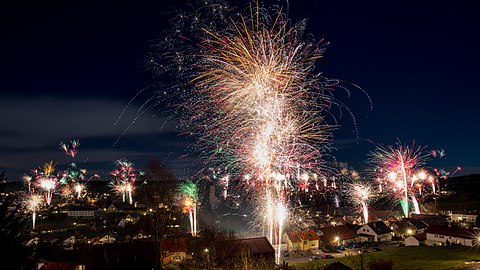
New Year's Eve
In the Gregorian calendar, New Year's Eve, also known as Old Year's Day, refers to the evening or the entire day of the last day of the year, 31... Wikipedia
- Also called: Hogmanay (Scotland), Calennig (Wales), Shchedryi Vechir (Ukraine), Ambang/Malam Tahun Baharu/Baru (Brunei, Indonesia, Malaysia, Singapore), Yangi Yil, Yılbaşı arifesi, Yeni İl ərəfəsi (Uzbekistan, Turkey and Azerbaijan), Karamu (African diaspora), Silvester (Austria, Bosnia and Herzegovina, Croatia, Czech Republic, France, Germany, Hungary, Israel, Italy, Liechtenstein, Luxembourg, Poland, Russia, Serbia, Slovakia, Slovenia, Switzerland), Réveillon (Algeria, Angola, Brazil, France, Macau, Morocco, Mozambique, Portugal, Romania, Tunisia, Wallonia, and French-speaking locations in North America), Kanun Novogo Goda (Russia), Ōmisoka (Japan), Pele ga Ngwaga o Mosha (Botswana), Nochevieja (lit. Old Night) (Spain and other countries where Spanish is mostly spoken)
- Observed by: Users of the Gregorian calendar
- Significance: The last day of the year in the Gregorian calendar
- Celebrations: Reflection, late-night partying, family gatherings, feasting, gift exchanges, fireworks, countdowns, watchnight services, social gatherings, during which participants may dance, eat, consume alcoholic beverages, and watch or light fireworks
- Date: 31 December
- date: 31 December
- Frequency: Annual
- Related to: New Year's Day
- Data source: DuckDuckGo